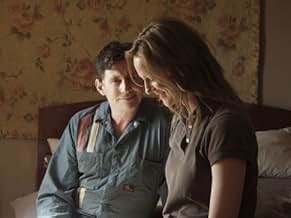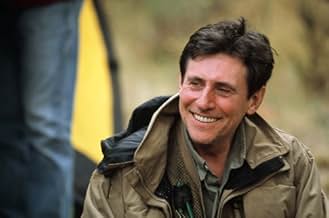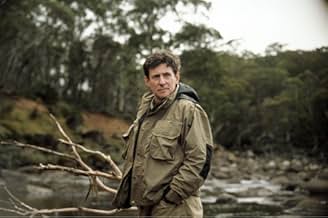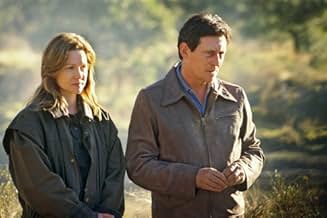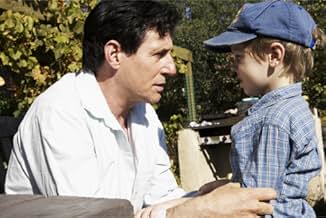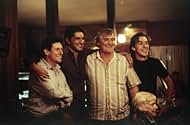AVALIAÇÃO DA IMDb
6,3/10
7,2 mil
SUA AVALIAÇÃO
Adicionar um enredo no seu idiomaAfter four men on a fishing trip discover a dead body in the water, they choose to delay reporting it and continue fishing.After four men on a fishing trip discover a dead body in the water, they choose to delay reporting it and continue fishing.After four men on a fishing trip discover a dead body in the water, they choose to delay reporting it and continue fishing.
- Direção
- Roteiristas
- Artistas
- Prêmios
- 11 vitórias e 22 indicações no total
- Direção
- Roteiristas
- Elenco e equipe completos
- Produção, bilheteria e muito mais no IMDbPro
Avaliações em destaque
I recently saw Jindabyne in Cannes and it is a brilliant movie. Thanks to a wonderful cast and Ray Lawrence the script comes alive on the screen.
Four fishing buddies find a dead girl in the river. They don't report their find until a few days later. This causes anger and disappointment from their families and the rest of the town; reactions they don't seem capable of understanding.
Byrne and Linney, especially, turn every line and every second into an intense moment. They're human beings, and it shows. You understand why their characters act like they do, but you don't always accept it.
Four fishing buddies find a dead girl in the river. They don't report their find until a few days later. This causes anger and disappointment from their families and the rest of the town; reactions they don't seem capable of understanding.
Byrne and Linney, especially, turn every line and every second into an intense moment. They're human beings, and it shows. You understand why their characters act like they do, but you don't always accept it.
This is an intriguing, evocative and multilayered film superbly acted and wonderfully filmed (mostly in single takes, it seems). It is also rather slow and meandering, and problematic. The basic plot could be set almost anywhere failure of personal relationships in the context of a failure of civic duty, but Ray Lawrence has chosen to adapt Raymond Carver's short story of the fishermen who took their time over reporting finding a woman's body to a highly specific place, Jindabyne, NSW, and to include the vexed question of black/white relationships in Australia.
As is pointed out in one of those awful cheery 1960s documentary being shown to the kids in the local primary school, the present day Jindabyne is a "second chance" sort of place, the old town having disappeared under the waters of Lake Jindabyne during the creation of the Snowy Mountains Hydro Scheme, though at very low water levels the old church steeple is said to poke out of the water. Unfortunately, as we are shown in the opening sequence there is still evil in the new town in the shape of the local electrician (Chris Heywood, very nasty), who likes to hunt and kill young women. It is his victim's body the four fishing buddies, Stewart, Carl, Rocco and Billy, find in the stream, tie to a log, fish for a day, and then the next morning decide to raise the alarm.
When it becomes public that the four delayed reporting their find to go fishing (why didn't they lie about when they found the body?) there is a predictable uproar. The dead woman was aboriginal and the local aboriginals are particularly upset since they see this as symptomatic of whitey attitudes). Rocco's aboriginal girlfriend is not impressed. But the greatest emotional impact falls on Stewart (an Irishman) and his American wife Claire whose relationship is already rocky.
At one point I thought Claire was going to crack the case, but instead we get a literally hazy scene where some kind of reconciliation between black and white is attempted. After seeing the superb "Ten Canoes" recently I found the whole aboriginal storyline contrived. What I did think was very powerful and affecting was the portrayal of a damaged marriage. Gabriel Byrne does not put a foot wrong as Stewart, an ordinary bloke resigned to what little emotional comfort he can get from his family, and Laura Linney gives great depth to her role as his wife Claire, a woman for whom motherhood is a daunting task.
The rest of the cast are fine. Debra-Lee Furness as Carl's wife Jude makes a dislikeable character understandable, John Howard as Carl puts in a solid performance and there are two good performances from child actors Eva Lazzaro as Jude's disturbed granddaughter, and Sean Rees-Wemyss as Stewart and Claire's son Tom.
Ray Lawrence clearly did not set out to create a crime story but he certainly shows that crime can have some unexpected collateral damage. He also has contributed to the "Cinema of Unease", a phrase Sam Neill once used to describe New Zealand cinema, by setting a story about personal and public guilt in such a glorious setting.
As is pointed out in one of those awful cheery 1960s documentary being shown to the kids in the local primary school, the present day Jindabyne is a "second chance" sort of place, the old town having disappeared under the waters of Lake Jindabyne during the creation of the Snowy Mountains Hydro Scheme, though at very low water levels the old church steeple is said to poke out of the water. Unfortunately, as we are shown in the opening sequence there is still evil in the new town in the shape of the local electrician (Chris Heywood, very nasty), who likes to hunt and kill young women. It is his victim's body the four fishing buddies, Stewart, Carl, Rocco and Billy, find in the stream, tie to a log, fish for a day, and then the next morning decide to raise the alarm.
When it becomes public that the four delayed reporting their find to go fishing (why didn't they lie about when they found the body?) there is a predictable uproar. The dead woman was aboriginal and the local aboriginals are particularly upset since they see this as symptomatic of whitey attitudes). Rocco's aboriginal girlfriend is not impressed. But the greatest emotional impact falls on Stewart (an Irishman) and his American wife Claire whose relationship is already rocky.
At one point I thought Claire was going to crack the case, but instead we get a literally hazy scene where some kind of reconciliation between black and white is attempted. After seeing the superb "Ten Canoes" recently I found the whole aboriginal storyline contrived. What I did think was very powerful and affecting was the portrayal of a damaged marriage. Gabriel Byrne does not put a foot wrong as Stewart, an ordinary bloke resigned to what little emotional comfort he can get from his family, and Laura Linney gives great depth to her role as his wife Claire, a woman for whom motherhood is a daunting task.
The rest of the cast are fine. Debra-Lee Furness as Carl's wife Jude makes a dislikeable character understandable, John Howard as Carl puts in a solid performance and there are two good performances from child actors Eva Lazzaro as Jude's disturbed granddaughter, and Sean Rees-Wemyss as Stewart and Claire's son Tom.
Ray Lawrence clearly did not set out to create a crime story but he certainly shows that crime can have some unexpected collateral damage. He also has contributed to the "Cinema of Unease", a phrase Sam Neill once used to describe New Zealand cinema, by setting a story about personal and public guilt in such a glorious setting.
This film is about a group of 4 men who discovers a dead body during a fishing trip. They continue fishing instead of reporting it to the police. This sparks outrage in the village, and the 4 men have to deal with the aftermath.
The character development is excellent. Each character is unique and different. Laura Linney deals with the tragedy by doing good deeds to redeem herself, while Gabriel Byrne deals with it by denial. The little girl, with an unfortunately unusual name, is provocatively antisocial. Billy is the histrionic one. Each character is different from another, and the interaction of them in the film is portrayed beautifully and convincingly in the film.
Laura Linney does the best job in the film. She is so convincing in her genuine attempt to redeem her husband's wrongdoings. The frustration that results from her husband's denial is painfully portrayed. The scene where she throws the vase at the ground is also a memorable display of emotion.
A comment says the film is dull. I am afraid I do not agree. This film is about the portrayal of different personalities when morality is in danger. The characters are so intriguing and complex, that just this alone makes viewing worthwhile.
The character development is excellent. Each character is unique and different. Laura Linney deals with the tragedy by doing good deeds to redeem herself, while Gabriel Byrne deals with it by denial. The little girl, with an unfortunately unusual name, is provocatively antisocial. Billy is the histrionic one. Each character is different from another, and the interaction of them in the film is portrayed beautifully and convincingly in the film.
Laura Linney does the best job in the film. She is so convincing in her genuine attempt to redeem her husband's wrongdoings. The frustration that results from her husband's denial is painfully portrayed. The scene where she throws the vase at the ground is also a memorable display of emotion.
A comment says the film is dull. I am afraid I do not agree. This film is about the portrayal of different personalities when morality is in danger. The characters are so intriguing and complex, that just this alone makes viewing worthwhile.
Jindabyne is in the southeast corner of New South Wales, Australia. A disturbed man kills a young aboriginal woman. Stewart Kane (Gabriel Byrne) and Claire (Laura Linney) have issues in their marriage. Stewart goes on a fishing trip with his friends Carl, Rocco, and Billy. Stewart finds the dead woman's body near their campsite. The men decide to continue fishing for the rest of the weekend.
The movie is trying to include a lot of stuff. The best that I can distill this into is a moral decay and callousness. Stewart and Claire are struggling with a loss that has sapped their joy. She discovers that she's pregnant. The crazy man ranting about electricity just adds to the generalized sense of unease along with the constant haunting music. It starts as an eerie murder mystery. If there is any scene that could galvanize the entire movie, it is Stewart discovering the body. The movie needs to spend more time with the four men discussing what to do. This movie needs clarity. The characters leave a lot unsaid which is frustrating. It's also a missed opportunity. Later, the movie tries to play the race card. In order for that to work, it needs to be set up better. For non-locals, it can come out of nowhere. This movie needs to concentrate on the primary issue and focus on it. Maybe the movie should start with the fishing trip first. It also brings back the crazy man which leaves the movie ending unsatisfying. This movie has a lot to say. It may be too much.
The movie is trying to include a lot of stuff. The best that I can distill this into is a moral decay and callousness. Stewart and Claire are struggling with a loss that has sapped their joy. She discovers that she's pregnant. The crazy man ranting about electricity just adds to the generalized sense of unease along with the constant haunting music. It starts as an eerie murder mystery. If there is any scene that could galvanize the entire movie, it is Stewart discovering the body. The movie needs to spend more time with the four men discussing what to do. This movie needs clarity. The characters leave a lot unsaid which is frustrating. It's also a missed opportunity. Later, the movie tries to play the race card. In order for that to work, it needs to be set up better. For non-locals, it can come out of nowhere. This movie needs to concentrate on the primary issue and focus on it. Maybe the movie should start with the fishing trip first. It also brings back the crazy man which leaves the movie ending unsatisfying. This movie has a lot to say. It may be too much.
With no fault to the actors (they all put on great performances), the overall story was not very well executed. The movie opens with a great zinger: a crazy old guy forces a young Aborigine girl's car off the road. But then, we're forced to endure 40 minutes of character development with an entirely new group of characters ... and we don't know why until the 40 minutes are up. It turns out that they are the ones who eventually discover the girl's body ... and the story progresses from there.
While the story does pick up at that point, it really goes nowhere. After 2 hours, I asked myself: was there a point to this, or was it just to see the characters struggle with accusations of racism and stupidity of how they handled the discovery? The story was ultimately unsatisfying and felt unfinished. While it is well acted, there's not a strong enough backbone in the film to warrant recommending it.
While the story does pick up at that point, it really goes nowhere. After 2 hours, I asked myself: was there a point to this, or was it just to see the characters struggle with accusations of racism and stupidity of how they handled the discovery? The story was ultimately unsatisfying and felt unfinished. While it is well acted, there's not a strong enough backbone in the film to warrant recommending it.
Você sabia?
- CuriosidadesGabriel Byrne accidentally stepped on a Brown Snake, one of the world's deadliest, while walking through the bush one day on the set. If he'd stepped on the other end he'd have been bitten. Gabriel Byrne told the director Ray Lawrence that he was almost killed, to which Lawrence replied: "No worries mate. You would have had 24 hours..."
- Erros de gravaçãoJust before the fishing trip, Stewart dyes his graying hair black. At the river, the gray reappears, but his hair inexplicably turns jet-black again upon his return.
- ConexõesFeatured in At the Movies: Episode #3.22 (2006)
Principais escolhas
Faça login para avaliar e ver a lista de recomendações personalizadas
- How long is Jindabyne?Fornecido pela Alexa
Detalhes
- Data de lançamento
- País de origem
- Central de atendimento oficial
- Idiomas
- Também conhecido como
- Джиндабайн
- Locações de filme
- Empresas de produção
- Consulte mais créditos da empresa na IMDbPro
Bilheteria
- Orçamento
- AU$ 15.000.000 (estimativa)
- Faturamento bruto nos EUA e Canadá
- US$ 400.438
- Fim de semana de estreia nos EUA e Canadá
- US$ 28.298
- 29 de abr. de 2007
- Faturamento bruto mundial
- US$ 6.044.112
- Tempo de duração2 horas 3 minutos
- Cor
- Mixagem de som
- Proporção
- 2.35 : 1
Contribua para esta página
Sugerir uma alteração ou adicionar conteúdo ausente



